This G6PD Deficiency Foods To Avoid List was created to share food triggers for this genetic disorder.
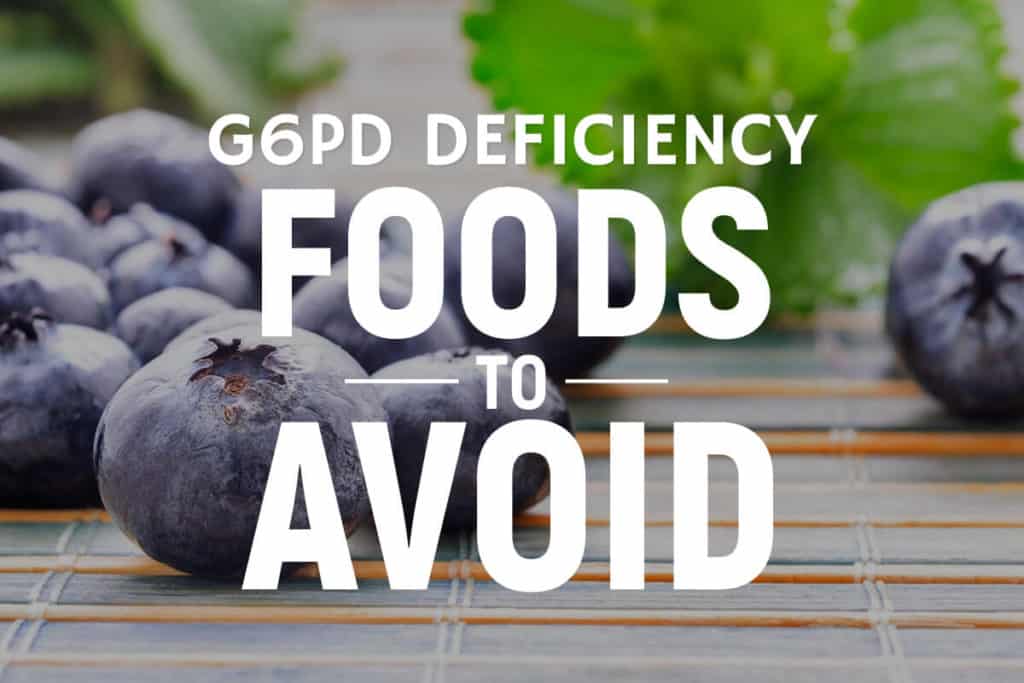
What is G6PD? G6PD Deficiency (glucose 6 phosphate dehydrogenase deficiency) is a hereditary genetic disorder that can lead to problems with anemia.
G6PD Deficiency as defined by G6PD.org:
G6PD Deficiency is a hereditary abnormality in the activity of an erythrocyte (red blood cell) enzyme. This enzyme, glucose-6-phosphate dehydrogenase (G-6-PD), is essential for assuring a normal life span for red blood cells, and for oxidizing processes. This enzyme deficiency may provoke the sudden destruction of red blood cells and lead to hemolytic anemia with jaundice following the intake of fava beans, certain legumes and various drugs.
Table Of Contents:
G6PD Deficiency Foods To Avoid
If you or a loved one lives with the g6pd deficiency at home, then you should know about these trigger foods that can cause problems.
Here’s information on G6PD deficiency triggers according to KidsHealth.org (source):
Triggers of hemolysis in kids with G6PD deficiency include: – illness, such as bacterial and viral infections, some painkillers and fever-lowering drugs [including aspirin], some antibiotics (most often those with “sulf” in their names), Quinine and other antimalarials derived from quinine. Most antimalarial drugs with “quine” in their names, Fava beans (also called broad beans) and Naphthalene (a chemical found in mothballs and moth crystals)
For a complete and official list of g6pd foods to avoid, your doctor should provide you all the information you need. These are just some of the main foods to avoid that I’ve compiled up myself as of recently.
Foods To Avoid List
Legumes are one of the worst culprit trigger food groups with the broad bean or Fava Bean being the worst. So number 1 on the avoid list are, Fava Beans.
- Fava Beans (Broad Beans):
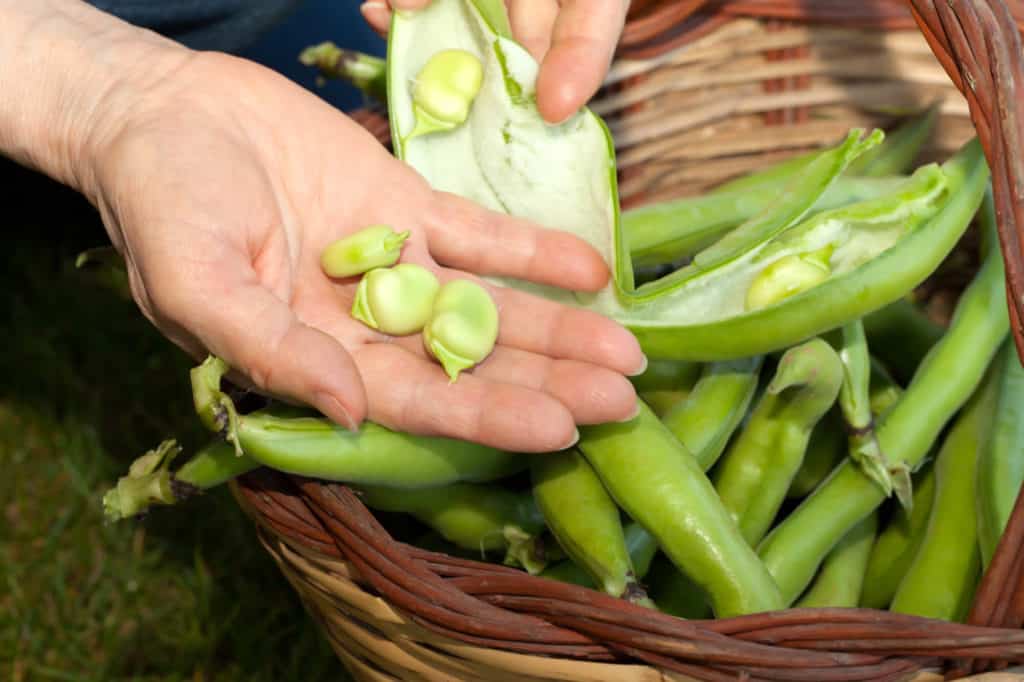
Fava or Fave Beans are one of the the worst g6pd foods to avoid. If you’re nursing a baby with this genetic condition or you yourself have it, make sure you never consume these.
Because it’s good to know, and you never know, here’s how to say Fava Beans in many other languages (source):
- Arabic: Foolle
- Catalan: Fava
- Chinese: Tzan-Doo
- Dutch: Tuinboon
- English: Fava or Broad Bean
- Farsi (Persian): Ba-ghe-Leh
- French: Fève
- German: Favabohnen (Fava bean), Dicke Bohnen (thick bean), Saubohnen (sow bean)
- Greek: Koukia (“Fava” is an appetizer made from dried fava beans)
- Hebrew: Polle
- Hungarian: Lóbab
- Italian: Fava (pl. fave)
- Kurdish: Paqla
- Malay: Kacang Parang
- Spanish: Haba
- Turkish: Bakla (“Fava” is an appetizer made from dried fava beans)
- Urdo (Pakistan and India): Lobhiya, Rajma, Jheam
- Thai (Thailand): two-ah pak-ah
- Legumes: Legumes in general are g6pd foods to avoid. Like fava beans/broad beans, many other legumes can bring on a hemolytic response.
Here, the Honor Society of Nursing has a good explanation of why legumes are bad for g6pdd.
Legumes and carbohydrates are the two main food groups that traditionally trigger G6PD deficiency symptoms. Legumes are plant products that include beans, peas, lentils, and soy. Fava beans in particular tend to trigger side effects. The carbohydrates that cause the most problems include white flour, refined sugars, and high fructose corn syrup, Additional food products that can cause G6PD deficiency syndromes to appear include tonic water, items that use blue food coloring, and products that contain sulfites, such as wine and dried fruits. – STTI
- Kidney beans
- Lima beans
- Black beans
- Refried beans
- Lima beans
- Kidney beans
- Soybeans
- Alfalfa sprouts
- Peanuts
- Licorice
- Carob
- Peas
- Lentils
- Soy
- Tofu
- Bean curds
- Hummus
- Soy Beans:
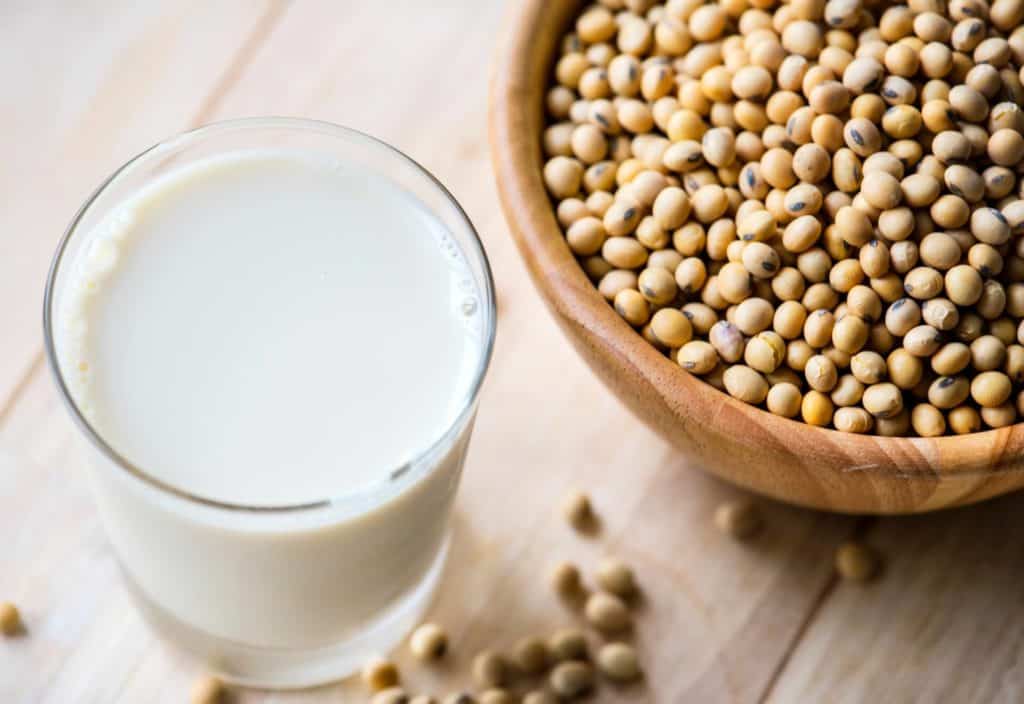
- Food products with soy (a lot of packaged products have it): Miso soup, tofu, soy protein and the countless packaged foods with soy derivatives.
- Black & Green tea and their extracts
- Blueberries
There are mixed opinions on fresh blueberries and g6pd deficiency. The joy of freshly baked blueberry muffins in the morning may still be attainable. There are over 440 variants of this genetic disorder that range from mild to severe. Those with a moderate to mild type may handle blueberries without getting triggered, but in general, if playing it safe, blueberries are on the trigger foods list.
- Bitter Gourd
- Garden eggs (Eggplant):
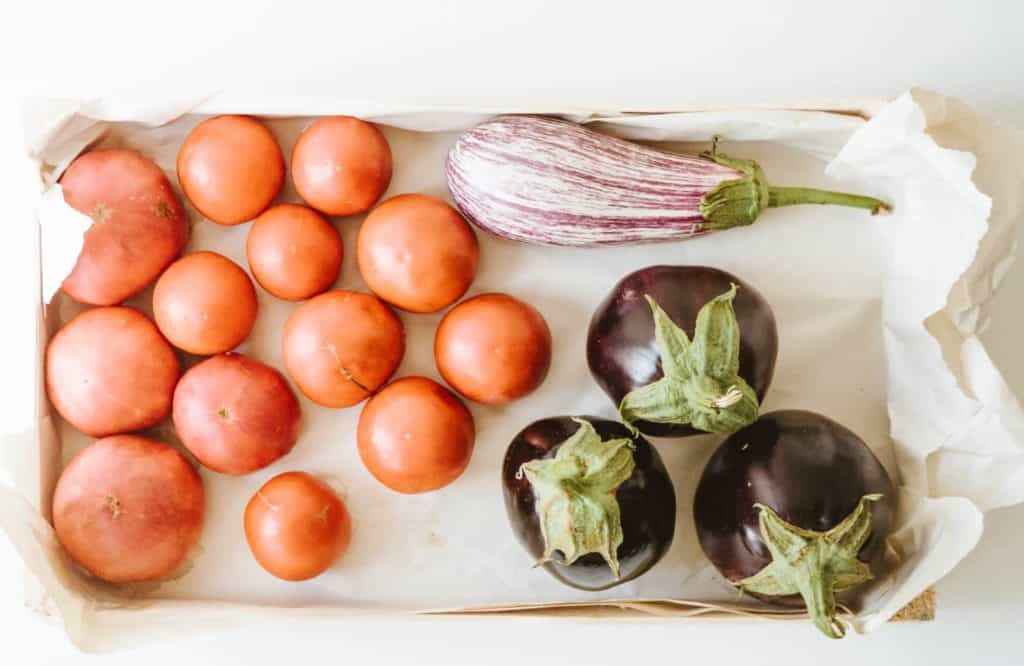
From what I can see these are the same thing as eggplants. Garden egg may refer to the smaller eggplants common to Africa, the Mediterranean and parts of Asia.
- Sulfites
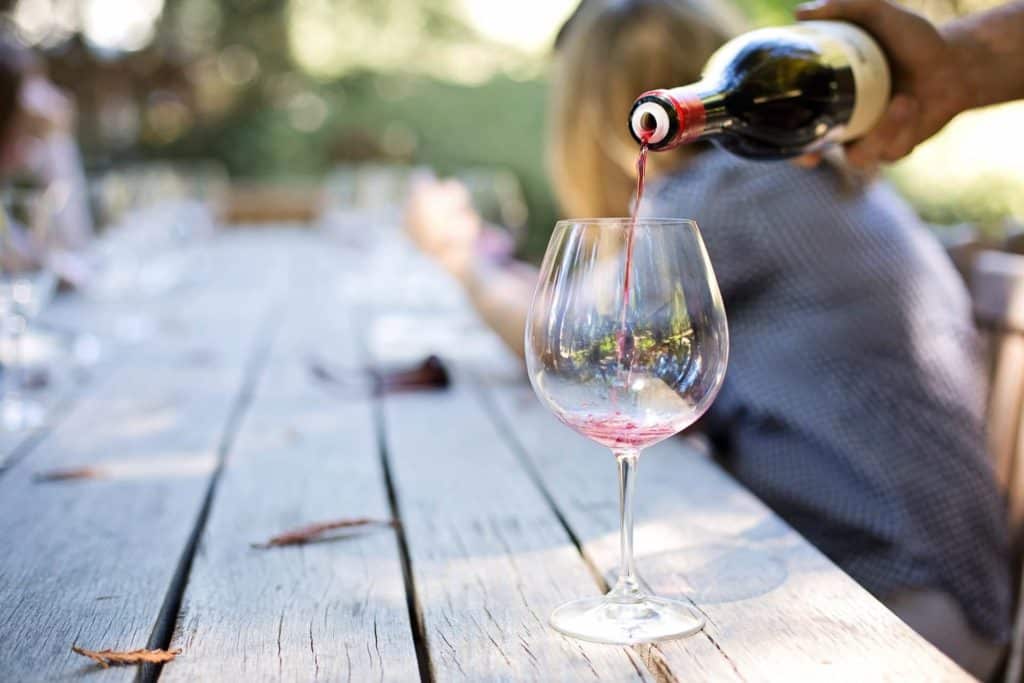
Sulfites can cause hemolysis in G6PD deficient persons. Sulfite foods include very common ones like dried fruits, wine, wine vinegar, pickled foods, shrimp and even trail mix.
Many people besides those who have G6PD have a sulfite sensitivity. The following foods taken from a WebMD list of sulfite containing foods and ingredients are good to avoid for g6pd:
- Baked goods
- Soup mixes
- Jams
- Canned vegetables
- Pickled foods
- Gravies
- Dried fruit
- Potato chips
- Trail mix
- Beer and wine
- Vegetable juices
- Sparkling grape juice
- Apple cider
- Bottled lemon juice and lime juice
- Tea
- Many condiments
- Molasses
- Fresh or frozen shrimp
- Guacamole
- Maraschino cherries
- Dehydrated, pre-cut, or peeled potatoes
Ingredients with sulfite to look for on food labels include (source):
- Sulfur dioxide
- Potassium bisulfite or potassium metabisulfite
- Sodium bisulfite, sodium metabisulfite, or sodium sulfite
- Menthol & Mints: chewing gum, mints, vapors, sprays, etc.
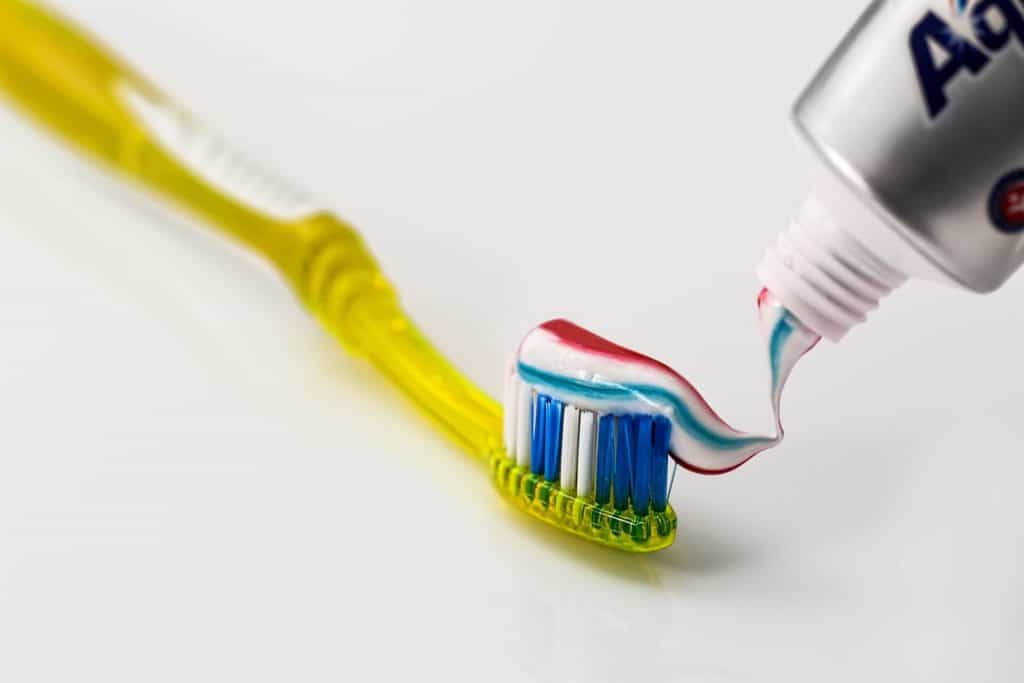
G6pd and menthol don’t pair well together. This means staying away from most toothpastes and mouthwashes. Luckily there are many great alternatives for teeth care and your dentist can refer some good menthol free products.
- Packaged meat
- Canned fish
- Margarine
- Packaged salad dressings
- Hot dogs
- Dried potatoes and potato chips
- Low fat cheese
- Sausage and other processed meats
- Sweet & sour sauce
- Worcestershire sauce
- Ascorbic acid
- Packaged Gluten Free Foods
- Tonic water
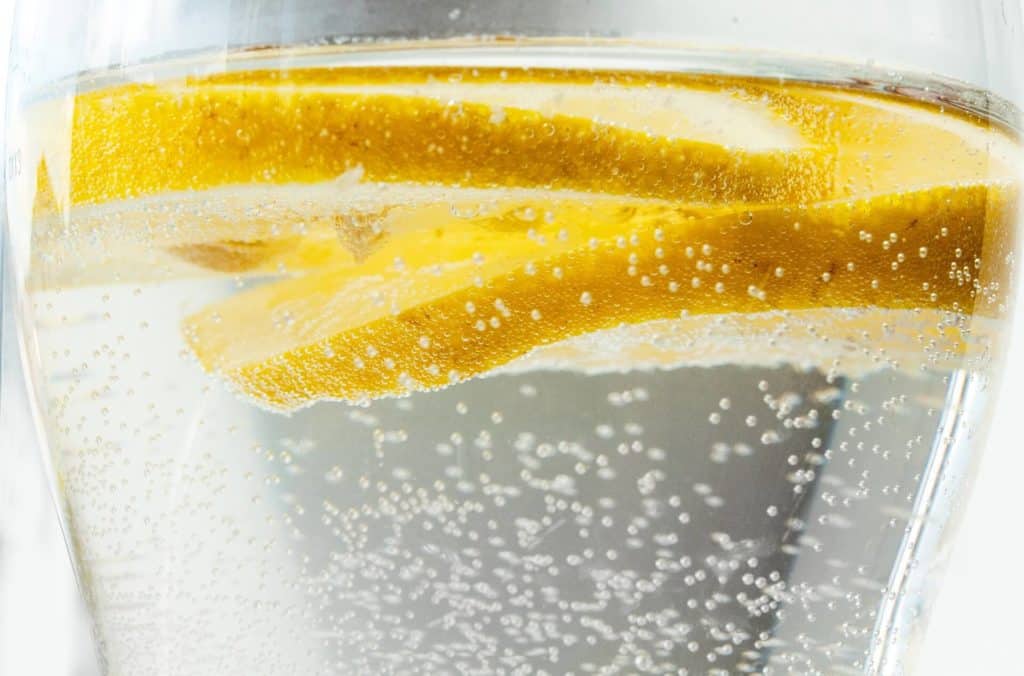
- Bitter melon
- Simple carbohydrates: corn syrup, white flour and refined sugar
- Peanut containing foods
- Vitamin K:Vitamin K3 may be tied with hemolytic anemia.
- Artificial Blue Coloring: Blue food colorings like Toluidine Blue are dangerous for those with g6pd. All artificial dyes could be g6pd deficiency triggers.
- Chinese Herbs:
Certain Chinese herbs like Rhizoma coptidis, Flos Ionicerae and Calculus Boris have been known to cause hemolytic responses in people with g6pdd. For more on Chinese herbs to avoid for g6pd deficiency, go here to see all the avoid herbs list Chinese Herbs to Avoid.
Conclusion: G6PD Deficiency Foods To Avoid
G6pd deficiency foods to avoid are just one category out of multiple that must be learned if you or someone in your family has the g6pd deficiency inheritance. It’s easy to work around any potential triggers if everyone in the household becomes knowledgeable about it.
The key to staying symptom free and not letting g6pd deficiency negatively affect you is to avoid triggers.
Exposing red blood cells to triggers leads to hemolytic anemia.
G6PD deficiency is a lifelong condition that can be very successfully managed forever. 700,000,000 have g6pd deficiency. It’s easily manageable if you know all the trigger dangers.
As well as foods to avoid, there are many medications and household common chemicals that need to be avoided, like mothballs (naphthalene), hair dyes, henna tattoos, menthol containing cleaners, rubs and also pesticides.
If there’s a G6PD Deficiency diet, it may be a diet rich in antioxidants and healthy fats.
Simple carbohydrates are g6pd deficiency foods to avoid in themselves, so a more paleo style of eating or Mediterranean with the healthy oils and fats, minus the wines, could be good. Step one is learning all the G6pd deficiency foods to avoid. Next it seems like a good idea to learn about any successful G6PD Deficiency diets or ways of eating that have a good track record of keeping complications away.
Thanks for visiting our g6pd deficiency foods to avoid list blog post.
If you have any questions, comments, corrections or suggestions, please let us know!
UP NEXT: An article here on the site about the Carnivore Diet Plan, and its potential in helping with autoimmune conditions.

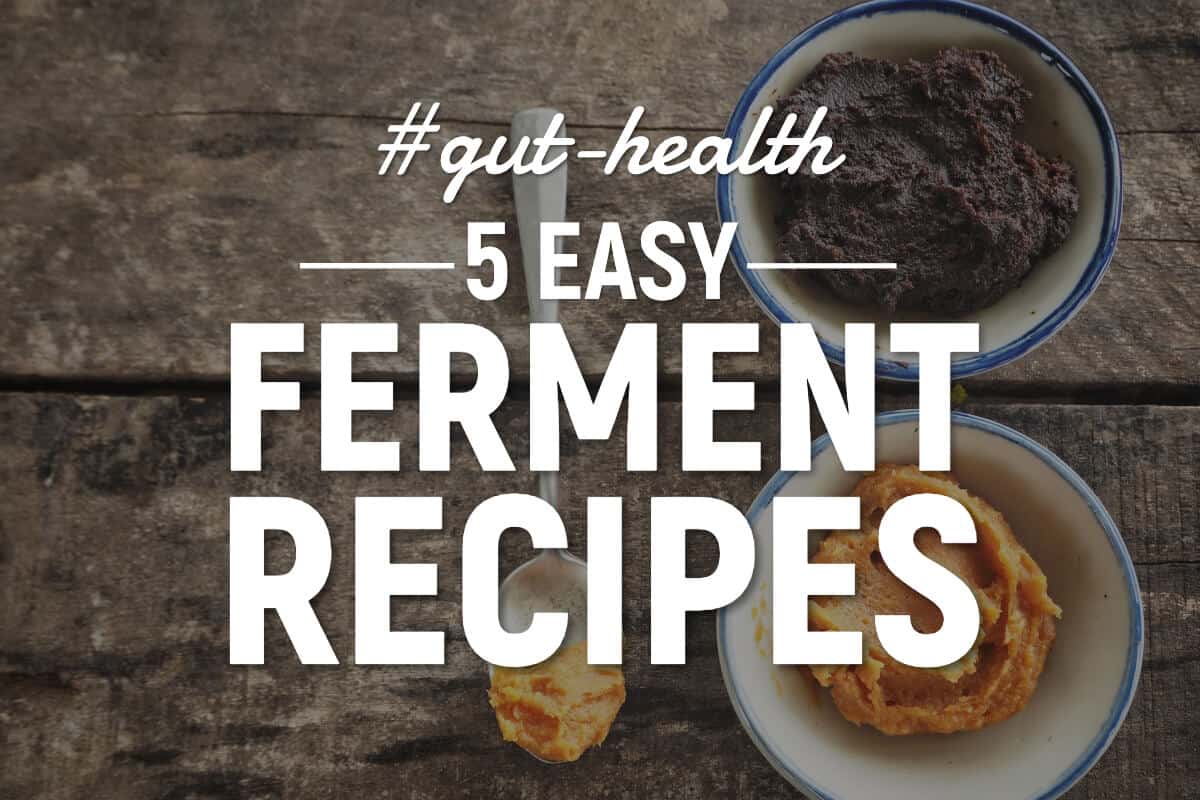
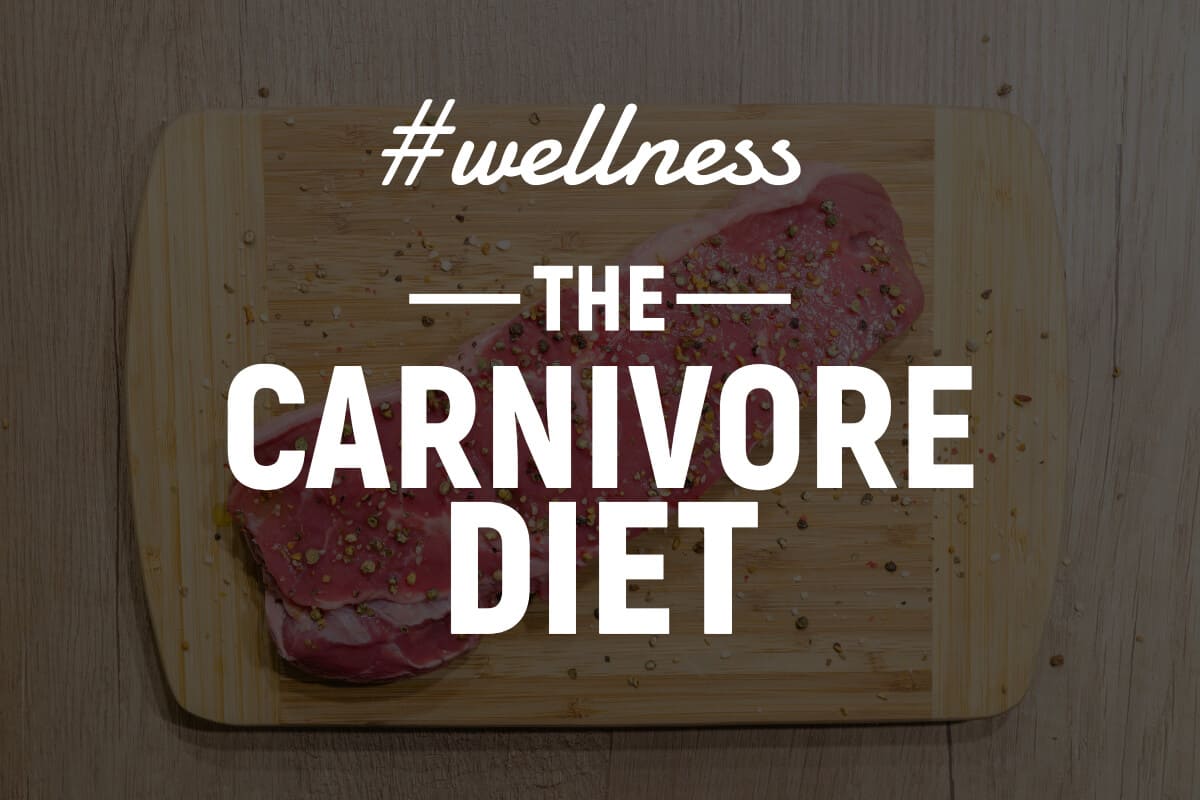
I need to know if soil products are sulfites in skin care are OK to use on a daily basis also including black and green tea extract in skin care products please if you have any information on this is important because most skin care products especially for the face have many of these ingredients
Hi Marcelle, that is a good thing to look into. Sulfites are definitely no-go’s for G6PD, but I’m not sure about those tea extracts. In general we stay away from all skin creams, especially sun screens, and just use coconut oil for any moisturizing needs. That avoids any issues with G6PD, but to give you some helpful info on this subject, I found a few good informational links online: 1 good resource, this link talks about sulfa drugs and G6PD, and this one is a resource page for articles related to sulfites and G6PD.
Do you have any references for the blueberry connection? Everything I read is just hearsay on the internet and opinion is divided. Do we have any science/case studies on blueberries inducing haemolysis?
Thanks
Philippa
Hi Philippa,
This is the exact thing I’d like to know as well. I will do some more digging on it. Either way it’s worth adding to the No-Eat list just to play it safe. I’ll update the post in the future with more I find on blueberries. Thanks for the comment.
If my son had g6pd, when he ate blueberry, sometimes he may nosebleed.
Thank you for this information Peter. I hope he recovered quickly after. Did he? Was he OK and healthy if you avoided blueberries and these bad-for-g6pd foods?
Blueberries are high in histamine and nosebleeds are common in kids due to high histamine level especially when they consume high histamine foods and play / run after consuming high histamine foods (cheese, blueberries, bananas (histamine liberator). Running/ exercise uses their methyl groups and beside nosebleed they can also get short of breath quicker than other kids.
I have G6pd and I’m 27, only real blueberries for me creates rashes and i get extremely itchy but it’s only with real not artificial blueberries
Well I’d still stay away from artificial blueberries! (my child can do blueberries fine after slow testing them).
I got a slight head ache after eating portabella cap mushrooms. Wondering if it was that because I was G6PD deficient. I know onions and the mere smell of garlic can trigger this G6PD head ache. I also ate fish sauce fermented cabbage, radish and cucumber. I believe it was a no MSG fish sauce and never had problems with it before. (MSG in miso soup give me pressure head aches)
Hey Michael, thanks a ton for this info. My son has G6PD, and I’m doing what I can to learn about it, so we can avoid any major complications with it, hopefully forever.
So far our son does ok the little he’s had of foods cooked with garlic, but I don’t think he’s eaten onions yet, so this is good to know.
Appreciate the comment Michael!
My family and I have G6PD deficiency, apart from avoiding broad beans and aspirin . We basically eat everything you listed!
Hey Jo, great that’s always good to hear. For us it’s just our boy, but we’re playing it safe. My wife tests out some and so far so good. But we’re avoiding all legumes. So you eat most other legumes and all is good? What about blueberries and red wine? Thanks
Regarding women with G6PDd. Since the G6PD gene is carried on the X chromosome, women almost always have one good G6PD gene and one defective gene. On average then half of her red blood cells would be good and half would be deficient. It is random, so at any point in time the ratio could go either way. Your son inherited his X chromosome from his mother and since males have one X chromosome and this is where the G6PD gene is, he is 100% deficient.
Pumpkin , flour, onion, garlic, shrimps, fake Honey, wine , beer, are the foods that gave me raised blood pressure and fast heart rate. Thank you for your work.
Fake honey – wow very interesting. Have you seen how they put honey in a bowl then pour warm water over it, and if it’s real, you’ll see the shape of the honeycomb form? Fake honey is everywhere and marketed as real. Thanks for the comment, I’ll make note of all of these, as we use all in our house, especially pumpkin, onion, garlic and shrimp.
I have a grandson with this condition. I need a whole manual that will give the information that goes along with the foods that don’t agree with him. I cook variety of foods and I have a tendency to mix all types of foods. I gave him some pork and beans and wieners. He became sick. He had a fever and had to be taken to the hospital.
I have G6PD and due to lack of proper instructions I have experienced eating all the ingredients that show on this list.
However, nothing really happened to me.
The only time that I really suffered from this deficiency was when I took Quinine against Malaria during a visit to the far east.
It nearly killed me.
I got the conclusion that each one with this condition, is sensitive to different parts of the list and medicines.
Hey Alberto! This is my hope, that my son can just eat all of these things and nothing really will happen. However, I’m playing on the total safe side so far. Thank you very much for this information about quinine! We have to be safe from both malaria and dengue, luckily papaya leaves are plentiful and ok for g6pd, but I will remember this about quinine. Did you have to do a transfusion or anything like that when you say it nearly killed you? Thanks
Hello, your are tragic my friend. You are not hematologic. I have worst type of g6pd. I wonder who tell you about white flour and hemolysis lol. The reason who eat only some sugars is other no hemolysis. You read maybe g6pd. Org Mr Dale hahhahaha
Hey John, not sure how to reply to this, but yeah I am playing it safe. If I need to add more to the list or change things around I’m open to editing the article always. Would appreciate anything you can send. No need to be cynical or anything, cheers.
Hi John
Thankyou so much for this info.
My son has g6pd lucky for me they did the test when he was born (not that any of us had it let alone heard of it) he got meningitis at 2.5months which was super scary for us but was treated well and now he has recoved well (he’s now 1.4years old. He eats everything really even onions and garlic cooked in a curry. I’ve avoided all the major triggers but today he drank some juice which contained blueberries (maybe had a sip or 2). So now I’m super panicking about him. Hopefully he will be okay. You are doing a wonderful job at all your research and keeping your child safe. I’m gonna make sure there is nothing in the house that contains blueberries ever again nor will I let anyone bring anything in.
Hi Zulekha, wow meningitis at 2.5 months must have been very scary yes. That’s really good to hear all is OK and he’s 1.4 now. Ours is just a bit older. Almost 2. I hear that blueberries are fine for many with this, so hopefully it will be like nothing, but that is also scary. I have not let him try anything blueberry yet. At the end of the day it may only be a couple things that cause issues for many, instead of everything on the list. Or at least that’s my hope. Our son had a bit of jaundice when born so we did the test right after birth as well and found out then. Great you have a healthy boy!! God bless
I have G6PD and do not find this list to be very helpful, which is common. The reason I do not view this and similar lists as helpful is because they rarely, if ever, include a scale of, let’s say, 1 – 10 of the potential adverse impact from the items listed. Just spewing a laundry list of items with zero context is utterly useless. For example, I drink green tea three times per day have done so for more than a decade. On a scale of one to ten how adverse is green tea for people with G6PD as compared t fava beans? Fava beans being a 10 for potential level of adverse effect. Is green tea a 10 also? Or is it a 2? If green tea is a 2, then I would argue the benefits outweigh the risk. If green tea is a seven or higher, then I would consider the risk may outweigh the benefits. Simply listing anything and everything is almost completely uninformative.
A much needed comment on this article. Thank you for the insights. This helps me see the big picture on this. I will adjust.
Just like some of the people in this comment section, I too had most of the food listed here and I honestly enjoy them. I have always avoided fava beans and being near to mothballs, thats about it.
I guess to find out which food actually affect me will be a lot of work, cos you know, as a working adult, I’m always tired. It will take a lot more effort to recognise the other symptoms and triggers.
Question – are mothballs dangerous only when you stand at a urinal? What if you walk by and go to the toilet stall? Mothballs are still in the public restroom, but you’re not right next to it. Would this be OK?
Our pediatrician was telling us not to touch moth ball. And the only thing not to eat is Fava bean.
Our son with G6PD also enjoys most of the food listed above.
No, mothballs are never acceptable…even if you inhaled once…its a high risk. My daughter (now 14 going on 20) has G6PD. You have to test your child to see what type of G6PD he/she has…different types, levels..require different dietary restrictions. My daughter eats anything except fava beans, take Ibuprofen and she is health as a horse. Hope this helps and that it gives you some home for a stress free future.
Give you some hope….sorry!
Hello: My son has g6pd deficiency and autism. He has lots of food sensitivities as well. Do you know if chia seeds are ok? I can’t find any information on this. Thanks. Great article.
Remy
Would seem to be that chia, a seed, is safe. Nuts and grains are not mentioned on the Avoid Lists, it does not seem.
Hello, John,
‘
Follow-up on this article … Hoping you still are tracking comments! Really hoping.
Carob is on your Avoid List? As is molasses? Also, canned fish?
What about powdered lemon or lime skins/zests??
Blueberries should not be there, it seems … Blueberries are said to be safe. It is blue dye/colouring that is the issue and products supposedly containing real blueberries were using the blue dyes for colour and triggering g6pdd reactions.
Many thanks.
I feel it’s easier to just give the allowed to eat food!

That’s a long list to remember to avoid
You can test any of these out. I’m finding my son able to eat blueberries. We won’t test the mothballs though.
why is eggplant not allowed?
Hi All, I’m a 41-year-old man with Greek blood and this year I had a severe hemolytic crisis (5 days in the hospital and many blood transfusions) after eating a plate of fresh fava beans. Before that I lived a relatively ‘normal’ life and didn’t even know I had G6PD deficiency. Now, I am extremely sensitive to triggers. e.g yesterday I had a bit of soy sauce with sushi and today I’m fatigued and have a bad headache. All beans, all sulfites, and almost everything on this list affects me (except white flour, which I don’t eat a ton of, and oddly blueberries). The point I want to make is that I think after a hemolytic crisis, the body becomes very sensitive and its a journey to learn what your triggers are. But this list is very helpful, Thank you and good luck to all out there.
Thank you very much Chris for this experience share. The 2 things I stay away from are farva beans and urinal cakes. We are nature people so trees work fine. Harder when in a city, but it’s been no problem going into a public bathroom with them and my son going to the stall if a urinal has those. I’m curious, do you stay away from these? I hope you bounce back after some time abstaining from the other non G6PD friendly foods, and that it’s not more than that messing with you. Because I know after your gut health is messed up (different issue), you all of a sudden have food sensitivities to things you never did before. I’ll monitor my son after eating legumes as we do occasionally have lentils, garbanzos, sometimes others (but never ever Farva!). Thanks again for sharing this helpful reminder to anyone who reads this.